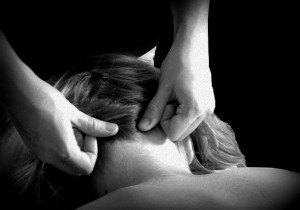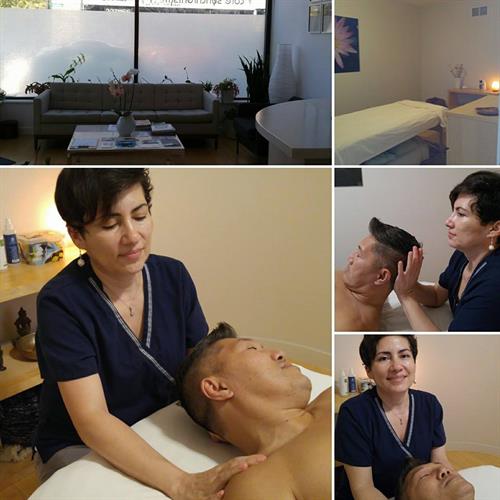 Are you frequently waking in the morning with sore cheek muscles, loose or temperature-sensitive teeth, a headache, earache, or jaw pain? If so, you may be grinding your teeth or habitually clenching your jaw in your sleep (or even during waking hours).
Are you frequently waking in the morning with sore cheek muscles, loose or temperature-sensitive teeth, a headache, earache, or jaw pain? If so, you may be grinding your teeth or habitually clenching your jaw in your sleep (or even during waking hours).
You already know that a clenched jaw gives away your anxieties. But it can actually lead to much more serious problems as well. Clenched jaws and grinding teeth increases the tensions in the temporomandibular joint (the TMJ or jaw joint) and creates tension. This wears the joint and can also lead to headaches, neck pain, and upper back pain.
Known as bruxism, this is a fairly common problem caused by a misaligned bite (malocclusion). It can also be a symptom of nervous tension or suppressed anger. Left untreated, bruxism can eventually wear down your teeth.
If your dentist has found your bite to be normal, you may be stressed or internalizing your anger. As a result of a tremendous exposure to stress, the development of temporomandibular joint (TMJ) disorders has reached pandemic proportions. TMJ sufferers experience high-intensity headaches, difficulty with chewing, painful joint clicking and popping, and other symptoms. With the progression of the pathology, individuals may even develop sleep disorders.
As postural distortions promote improper movement of the TMJ, multiple things happen. First, the muscles that move the jaw develop a spasm/strain imbalance – some muscles are overly contracted while some are overstretched causing pain. This can lead to uneven pressures in the joints causing asymmetrical wear patterns in their structure.
Restoring alignment and function of the TMJ, even in more advanced cases, alleviates these pain patterns and further breakdown of the joint.
Night guards may help protect the tooth enamel from damage but it never really keeps you from clenching, or otherwise addresses any bio-mechanical or neurological causes.
Stress, poor posture (like ‘text neck’), weak core muscles can cause the head and neck muscles to become over tight and painful — all things that can be corrected with proper evaluation and care!
TMJ (Jaw) Dysfunction Therapy provides you with relief of symptoms and treats the source of imbalance.
- Proper function of the TMJ is highly dependent on balanced positioning of the cranium.
- Postural distortions elsewhere in the body can perpetuate TMJ pain.
- Asymmetrical posture can lead to asymmetrical wear and tear on the TMJ.
- Addressing the factors that cause the dysfunction in the first place is vital for a successful treatment
- The National Institutes of Health recommends non-surgical treatment for TMJD whenever possible.
Neuromuscular Therapy treatment approach to correcting temporomandibular joint syndrome incorporates treatment directly to the painful areas of the jaw and head as well as to the imbalances of the pelvis, spine cranium that contribute to this dysfunction.
TMJ Anatomy
The TMJ is formed by the temporal and mandibular bones. Attached to the mandibular condyle is a fibrocartilage meniscus or articular disk, which allows the mandible to move smoothly. The masticatory muscles (temporalis, masseter, lateral pterygoid, and medial pterygoid) are responsible for movement and stabilization of the TMJ.
Bruxism
Due to stress, people often develop bruxism. Bruxism is a pathological clenching and grinding of teeth that usually occurs during sleep. Bruxism is caused by the hyperactive contraction of the masticatory muscles. Imagine any other muscles in our support and movement system kept under tight contraction for seven hours. Pathological hypertonus in these muscles will be formed, followed by restriction of range of motion, trigger point development, and other symptoms. With time, hypertonic condition in the masticatory muscles leads to the development of osteoarthritis in the TMJ, including negative effects on the articular meniscus. In such a case, the above-mentioned TMJ pathology starts producing severe headaches and painful “clicks.”
Testimonial
“My dental cleanings were very painful – I was left to chewing on one side that only made the TMJ worse, I was in constant pain. Immediately after my first session with Mara – my jaw pain was less and overall my jaw and face felt relaxed. My jaw could drop down and it was easier to open and close without fear of the clicking followed by pain. I can now tolerate a full dental cleaning without intense pain. To remain for 45 minutes with my mouth open was just impossible before. In just two treatments my TMJ complains/pain are 50% improved.” Stephanie Smith, Physical Therapist
TMJ SYMPTOMS
Most often when people have TMJ problems it results from the simple fact that when they put their teeth together, their TMJs are not in socket (remember this not a correct orthopedic position). In fact, this is another major difference between the TMJ and all your other joints – something outside of the joint itself (your teeth) can prevent the TMJs from staying in socket.
When people exhibit a problem with their TMJs, it is most often exhibited as; Problems associated with the jaw joint itself. Quite often, the disc is displaced to a position in front of the condyle. This results in first a “clicking” or “popping” sound. The disc at this stage is still able to slip or pop back onto the top position on the condyle during the open / close cycle
Pain emanating from the jaw joint itself
usually either an inflammatory response within the joint and /or highly innervated tissue being compressed.
Problems associated with the muscles.
Sore muscles (usually in the temple or cheek areas). Headaches that can be actually muscle soreness.
Limited opening.
Problems with the teeth.
Loose teeth.
Sore teeth.
Excessively worn teeth.
Loss of bone support.
Ear problems.
Hissing or ringing.
Ear pain, ear ache (in the absence of infection).
Vertigo, dizziness.
Full-Body Stress-Management Massage
As mentioned before, stress is the main cause of the development of bruxism and TMJ disorders; therefore, it is very important to those who suffer from TMJ disorders to receive full-body stress-management massage. From my experience, the phenomenon of bruxism can be reduced within five full-body stress-management massage treatments given on a weekly basis. Elimination of bruxism is an extremely important factor that will allow the masticatory muscles to be restored to normal metabolism and prevent re-accumulation of tension in the muscles. working with a massage therapist experienced in working with these muscle groups can get you out of pain quicker, schedule your appointment today click on custom session
Reference: Massage Today, December, 2004, Vol. 04, Issue 12, Boris Prilutsky, MA
Disclaimer: The information found through out this website is for educational purposes only, please contact your physician for questions about your health.
[schedule_now]
